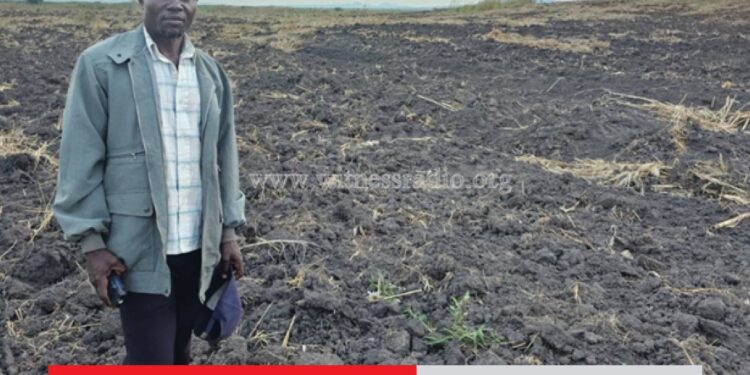Kampala, Uganda -October 5th, 2024; Witness Radio releases its mid-year report on forced land eviction, revealing a sharp increase across Uganda between January and June 2024. The report reveals staggering statistics: 90 documented land evictions have affected at least 363,021 Ugandans, with over 121,000 hectares of land under threat of being seized.
These occurrences are happening following a presidential directive on land evictions, with the majority of cases of evictions being characterized by violence, human rights violations/abuses, and total disrespect of communities’ land and environmental rights. Government security forces and private security firms and militias have been documented acting on behalf of wealthy investors and government agents and have been implicated in the use of excessive force, resulting in a series of human rights abuses, including death.
“Witness Radio is concerned about the unabated forced land evictions and foresees a large population losing its livelihood to land-based investments as the country enters a period of general elections,” Says Jeff Wokulira Ssebaggala, Country Director, Witness Radio—Uganda.
He attributed forced evictions to the government’s industrialization of Uganda’s land. This industrialization must be carefully implemented to protect smallholder farmers’ land and promote food security and sovereignty.
Key Findings:
•Attacks on Land and Environmental Defenders: In the period under review (between Jan and June 2024), 65 attacks on land and environmental defenders (LEDs) and climate activists challenging illegal land evictions and corporate harm on the environment in Uganda.
• Affected Population: Over 360,000 Ugandans were displaced, with a daily average of 2,160 people losing their livelihood. Land is targeted for oil and gas extraction, mining, agribusiness, and tree plantations for carbon offsets. While some investments have taken shape on the grabbed land, other pieces of grabbed land are still empty but under the guardship of military and private security firms.
• Land Under Threat: More than 121,000 hectares of land are at risk of being grabbed by influential investors and government agents.
• Complete Evictions: 22,962 individuals have been entirely evicted from their land, and land grabbers have fully grabbed 7,150.7 hectares of land.
• Pending Evictions: 340,059 Ugandans face imminent eviction threats, with over 114,292 hectares of land at risk of being seized.
• Regional Impact: The Central region remains the epicenter of evictions, recording 52 cases. This is followed by 24 cases in the Western region, 8 in the Northern region, and 6 in the Eastern region.
• Number of Cases documented: 90 land eviction incidents reported, affecting all regions of Uganda.
Eviction frequency.
Nearly four cases of land evictions are reported weekly, affecting approximately 15,126 people and threatening 5,060.12 hectares of land across the country.
An estimated 2,160 Ugandans face evictions daily to give way to land-based investments, with 723 hectares of land at risk of being grabbed daily.
Despite government interventions and promises to halt evictions, including directives from President Museveni, the report reveals that land grabbers frequently ignore these orders, deploying armed security forces, private militias, and police to carry out brutal evictions. Left without compensation or legal recourse, vulnerable communities are often displaced in favor of multinational corporations and influential local investors.
Case Highlights: The report details harrowing incidents like the murder of smallholder farmer Dan Ssebyala in Nakasongola, a district plagued by violent evictions involving absentee landlords and influential investors. Armed men ambushed Ssebyala following a confrontation over disputed land. This is just one of many incidents where land defenders are attacked, silenced, or even killed for opposing forced evictions.
In Kiryandongo District, security groups working for Major Taban Amin were documented torturing elected local leaders such as Councilor Fred Kangume after he opposed Amin’s illegal eviction of over 700 families. Such violent tactics have been reported as a commonly used approach to intimidate defenders and community leaders and silence opposition.
Impact on Communities:
• Food Insecurity: Evictions often destroy crops and livestock, exacerbating food shortages and malnutrition.
• Loss of Livelihoods: Displaced families lose their homes and agricultural land, forcing many into poverty.
• Violence and Trauma: Communities face violence, arrests, and intimidation for defending their land, leading to physical and psychological trauma.
• Disruption of Education: Forced displacement disrupts children’s access to education as schools are often destroyed in the eviction process.
Call for Action: Witness Radio Uganda calls on the government to strengthen the enforcement of land laws, protect local communities from illegal evictions, and ensure justice for victims.
Additionally, investors must adhere to international human rights standards and respect the communities they operate in. Financial institutions funding these projects must conduct thorough due diligence to prevent further human rights abuses.
Do you have a story in your community or an opinion to share with us: Email us at editorial@watchdoguganda.com













